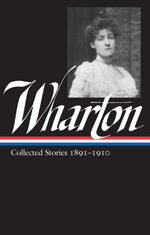From Edith Wharton: Collected Stories 1891–1910
Interesting Links
“The Age of Innocence: Early Letters from Edith Wharton” (Rebecca Mead, The New Yorker)
“What Edith Wharton Knew, a Century Ago, About Women and Fame in America” (Jia Tolentino, The New Yorker)
Previous Story of the Week selections
• “Xingu,” Edith Wharton
• “Baxter’s Procrustes,” Charles W. Chesnutt
• “Greville Fane,” Henry James
Buy the book
 Edith Wharton: Collected Stories 1891–1910
Edith Wharton: Collected Stories 1891–1910
Two novellas (The Touchstone and Sanctuary) • 36 stories • 928 pages
List price: $40.00
Web store price: $31.50
Save $25 when you buy both volumes of Edith Wharton’s stories.
“The Age of Innocence: Early Letters from Edith Wharton” (Rebecca Mead, The New Yorker)
“What Edith Wharton Knew, a Century Ago, About Women and Fame in America” (Jia Tolentino, The New Yorker)
Previous Story of the Week selections
• “Xingu,” Edith Wharton
• “Baxter’s Procrustes,” Charles W. Chesnutt
• “Greville Fane,” Henry James
Buy the book
 Edith Wharton: Collected Stories 1891–1910
Edith Wharton: Collected Stories 1891–1910Two novellas (The Touchstone and Sanctuary) • 36 stories • 928 pages
List price: $40.00
Web store price: $31.50
Save $25 when you buy both volumes of Edith Wharton’s stories.
 |
| A Cup of Tea (1904), oil on canvas by American artist Walter Granville-Smith (1870–1938). Click on the image to see the entire painting. Courtesy of The Athenaeum. |
It is a false charity to reader and writer to mince matters. The English of it is that every character is a failure, the plot a vacuum, the style spiritless, the dialogue vague, the sentiment weak and the whole thing a fiasco. . . . Is not the author very, very like a sick-sentimental school-girl who has begun her work with a fierce and bloody resolve to make it as bad as “Wilhelm Meister” [by Goethe], “Consuelo” [George Sand], & “Goodbye Sweetheart” [Rhoda Broughton] together, & has ended with a blush, & a general erasure of all the naughty words which her modest vocabulary could furnish?The future Edith Wharton wrote “Fast and Loose” for an older friend and, as she noted in her memoir A Backward Glance, it “was never exposed to the garish light of print”—which was true until the University Press of Virginia published it in 1977, exactly one hundred years after she wrote it.
Even read as parody, “Fast and Loose” is juvenilia of interest primarily to scholars and biographers. Yet at various points during her career Wharton’s youthful undertaking inspired her more mature fiction—usually by poking fun at both the work and her adolescent precociousness. In one early story, “April Showers,” young Theodora finishes writing her first novel, which is ultimately doomed to an unintentionally cruel rejection when her favorite “society novelist” submits a different work with the same title, April Showers, to the same publisher. The story opens with Theodora writing a mawkish ending for her novel, “But Guy’s heart slept under the violets on Muriel’s grave”—which happens to be the last line of Wharton’s own unpublishable novella.
Wharton revisited the theme of nascent authorship a few years later in the story “Expiation,” which again features a novelist preparing to make her debut. The story appeared in 1903, two years before the publication of The House of Mirth, as Margaret Drabble notes, so Wharton “had not yet enjoyed or endured the experience of finding herself a famous author, although the story shows that she had armed herself against it.” This time out, the novel written by the lead character of Wharton’s story is called Fast and Loose and it has found a publisher, but her friends—including her uncle, a bishop—fear that she may have chosen the “excessively suggestive” title without “realising all that it implies.” As it happens, the author made her choice deliberately (“I’ve handled the subject without gloves”) and is preparing herself eagerly and nervously for the possibility that the story will be a “succès de scandale.” What happens instead is the stuff of comedy.
Notes: A Mechlin cap, which the Bishop’s friend Mrs. Gollinger wears, is a head covering made of or trimmed with Mechlin lace. Revue de Paris was a renowned French literary magazine; the religious magazine or journal Reredos appears to be Wharton’s creation. (A reredos is a large screen or decoration placed behind the altar in a church.) La Cathédrale (1898) is a novel by Joris-Karl Huysmans that includes detailed descriptions of the Chartres Cathedral.
* * *
“I can never,” said Mrs. Fetherel, “hear the bell ring without a shudder.” . . . If you don't see the full selection below, click here (PDF) or click here (Google Docs) to read it—free!This selection may be photocopied and distributed for classroom or educational use.